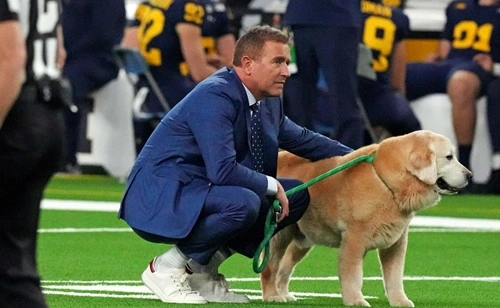Kirk Herbstreit, a beloved sports analyst and commentator known for his work with ESPN and “College GameDay,” surprised fans when he appeared with a service dog. Herbstreit, a household name in college football circles, is admired for his sharp analysis and charismatic on-screen presence. However, his association with a service dog left many viewers curious. Was it a medical condition, emotional support, or something deeper? This article explores why Kirk Herbstreit had a service dog and sheds light on the importance of these animals in people’s lives.
Kirk Herbstreit’s Background

Before diving into the specifics of his need for a service dog, it is essential to understand Kirk Herbstreit’s demanding career and lifestyle. As a former quarterback at Ohio State University turned college football analyst, Herbstreit’s life is filled with extensive travel, high-pressure environments, and intense public scrutiny. For decades, he has been a central figure in ESPN’s coverage of college football, offering pregame insights, in-depth analysis, and live commentary during games.
Such a lifestyle can take a toll, both physically and mentally. Constant travel, long working hours, and the pressure to perform can contribute to stress, anxiety, and health challenges. These factors might explain why Herbstreit turned to the assistance of a service dog.
Why Service Dogs Are Needed
Service dogs are trained animals that assist individuals with specific physical, emotional, or mental health needs. Unlike ordinary pets, these dogs are equipped with the skills to provide support for tasks such as:
- Guiding individuals with visual impairments.
- Alerting someone with hearing loss to important sounds.
- Assisting individuals with mobility challenges.
- Providing emotional stability during anxiety attacks or PTSD episodes.
These dogs are recognized under laws like the Americans with Disabilities Act (ADA) and are allowed in public places to support their owners.
Kirk Herbstreit’s Service Dog
Although Herbstreit has not publicly disclosed detailed information about why he had a service dog, several possible explanations align with the role such dogs play in their owners’ lives. One plausible reason could be stress management. Given his rigorous schedule and the high-pressure nature of his career, a service dog might have provided him with emotional support during overwhelming moments.
Service dogs are also known to assist individuals dealing with anxiety, depression, or panic disorders. It is not uncommon for people in high-profile careers, like Herbstreit, to seek support for their mental well-being. A dog’s calming presence and their ability to sense distress can help anchor someone who is feeling overwhelmed or stressed.
The Impact of a Service Dog
The presence of a service dog can have profound benefits, including:
- Emotional Support: Service dogs provide unwavering companionship and help reduce anxiety levels. For someone like Herbstreit, who is constantly in the public eye, this can be a source of calm amidst chaos.
- Stress Relief: Petting or simply spending time with a service dog can lower cortisol levels, reducing stress.
- Improved Focus: A service dog can help its owner stay grounded, allowing them to concentrate on their tasks without being overwhelmed by external pressures.
If Herbstreit’s service dog was indeed for emotional or mental health reasons, it speaks to a larger trend in society: the growing acceptance of mental health challenges and the acknowledgment of how service animals can help.
Breaking the Stigma
For many public figures, openly using a service dog can spark unnecessary speculation or judgment. However, Kirk Herbstreit’s openness about his dog may contribute to breaking the stigma surrounding mental health and the use of service animals. People in high-profile careers often face immense pressure to maintain a flawless public image. By bringing attention to the role of service dogs, Herbstreit may have indirectly encouraged others to seek help when needed.
Public Reception
Herbstreit’s fans reacted with a mix of curiosity and admiration. Many praised him for normalizing the use of service animals, while others expressed curiosity about the specifics of his need. Regardless, his choice to have a service dog sparked important conversations about mental health, stress management, and the role of service animals in supporting well-being.
Conclusion
Kirk Herbstreit’s decision to have a service dog underscores the vital role these animals play in improving lives. Whether assisting with physical tasks or providing emotional support, service dogs are more than companions—they are lifelines for many.
Though Herbstreit has not extensively elaborated on the specifics of his need, his openness sheds light on the pressures of high-profile careers and the importance of addressing mental health challenges. By normalizing the use of service dogs, Herbstreit has likely inspired others to seek the help they need, demonstrating that even the strongest and most successful individuals can benefit from support.
Service dogs remind us of the incredible bond between humans and animals and the profound impact they can have on well-being, even for someone as accomplished and composed as Kirk Herbstreit.



